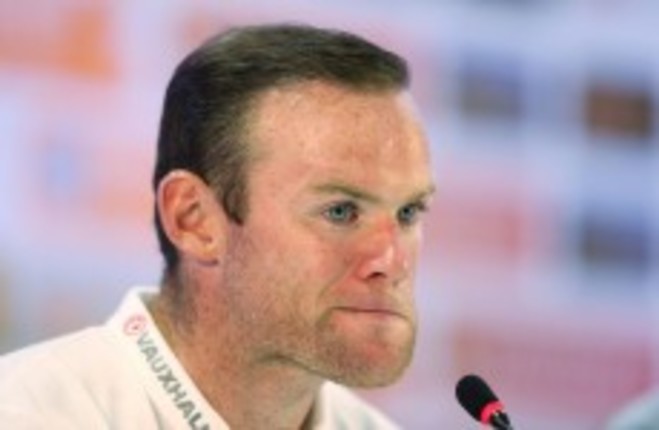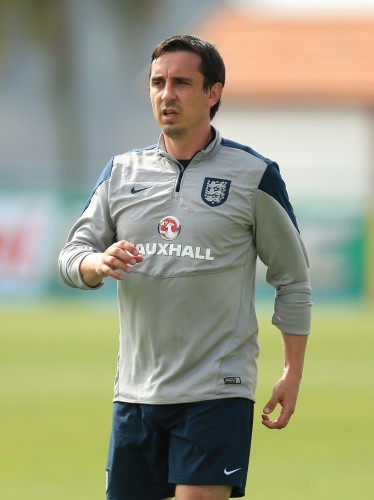WAYNE ROONEY SEEMS eager to get his excuses in early.
Instead of focusing purely on England’s win-or-bust game with Uruguay today, he instead recently took to Facebook to address criticism aimed at him.
“Sometimes wonder what the press are getting at,” he wrote on his official Facebook page.
“I said from the start I want to do everything I can to make sure I’m ready for these World Cup games and as part of that I was doing extra training a week before the squad joined up.
“That’s exactly what I did yesterday, my own extra training because that’s what I wanted to do.”
These dubious claims that the star is unfit or not training properly are perhaps unfair, but surely Rooney should ignore what’s being written about him. Instead of trying to win the PR battle, the only contest he needs to worry about is this evening’s crucial Group D encounter.
Moreover, by responding to the media’s provocative claims, he is making little attempt to hide an insecurity that has characterised his off-field behaviour for a substantial period — up to and including his fallings out with former United manager Alex Ferguson and the ensuing contract wrangles and uncertainty over his United future.
Rooney also seems peeved with the English media and public at large’s supposed fixation with him, though on this issue, the United star has let others do the talking.
“You can call it a debate or an obsession,” assistant coach Gary Neville told reporters.
“I don’t think either are wrong because every time I have been part of a tournament I have seen this with a player, whether it be (Paul) Gascoigne, (Michael) Owen, (David) Beckham or Rooney.
“We love it. The whole country loves creating a drama around one player.”
Yet it seems somewhat disingenuous for Neville to portray this issue purely as an English problem, as a country’s best player is invariably the most talked-about star. Are Brazil any less obsessed with Neymar? Have the Argentinians been especially eager to downplay Lionel Messi’s importance to the team? Is Luis Suarez just another player as far as the Uruguayan journalists and fans are concerned? Indeed, putting Rooney in the same category as the three aforementioned footballers may seem a tad generous, but he is surely still the England team’s most naturally gifted player at his best.
Nonetheless, it is perhaps no wonder that signs of increasing frustration can be detected in Rooney’s recent comments. Roy Hodgson was praised for his ‘bold’ team selection against Italy, however playing the United star out wide was hardly brave.
Although Rooney did produce an immaculate cross for Daniel Sturridge’s goal in the opening match, that moment aside, the 28-year-old was more of a liability than an asset for England. Throughout the game, he looked unhappy to be playing on the wing (or at least, until he was belatedly moved to the centre), rarely having the discipline to properly track Italy’s influential full-back Matteo Darmian and almost costing his side on numerous occasions as a result.
(Gary Neville has defended Wayne Rooney following recent criticism of the star)
All the latest reports indicate that Rooney will be moved to his favoured number 10 role at the expense of Raheem Sterling — easily England’s best player against Italy — for the Uruguay game tonight. It would be another somewhat conservative decision from Hodgson, whereas dropping Rooney is obviously the most radical prospective outcome, and many high-profile commentators, including Clarence Seedorf, have advocated this move.
Nevertheless, surely playing to Rooney’s strengths without banishing Sterling to the wing is feasible. Liverpool have had significant success this season, most notably in their 3-0 victory over Manchester United, playing the diamond formation with the teenage star behind the two strikers. Against a technically limited Uruguayan midfield, England’s players are likely to see much more of the ball than was the case against the Italians, so surely playing their two stars centrally would not be a considerable risk.
Yet predictably, it looks as if they are opting for the more cautious option, effectively punishing Sterling, after his magnificent display against Italy, in the process.
The move would consequently reiterate the negative mentality that has affected England in numerous past major tournaments, owing to media pressure among other issues. On that note, ahead of the Uruguay match, captain Steven Gerrard was asked to address the squad, and a loose sample of his speech was related back to reporters.
“Basically, [I told them] to realise it could be a terrible, long, frustrating summer if we don’t get it right on Thursday,” Gerrard said. “There is no hiding place for a player when you go out of a tournament earlier than you expect. It can be tough and it can take an awful long time to get over it. A lot of people know that in the dressing room but there are a few young lads in there too, so it was important for them to realise what is at stake and how important this game is.”
Perhaps Fabio Capello was correct in refraining from awarding the England captaincy to the notoriously anxiety-ridden star, because such words are not exactly inspiring, with Gerrard preferring to emphasise the negatives that come with losing rather than the positives associated with winning.
It suggests that, in the English players’ minds, there is a fear inextricably linked with the potential backlash that faces them at home. And expect this excuse to recur should they actually exit the competition in the opening round for the first time since 1958.
Furthermore, reading between the lines, the above comments attributed to Rooney, Neville and Gerrard each at least hint at one common complaint — it’s all the media’s fault.
Granted, this pressure is undoubtedly intense, but the English must embrace it the way all the top teams tend to do, rather than taking to Facebook etc to lament such criticism. Otherwise, they could indeed suffer an embarrassingly premature World Cup exit against an ordinary enough Uruguayan side, thereby striking a fitting conclusion to the perpetually anti-climactic exploits of England’s near-obsolete ‘golden generation’.


